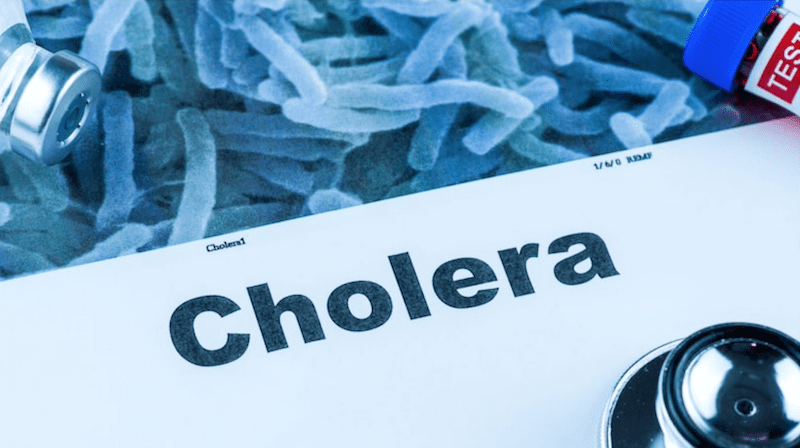
Cholera outbreak: Nigeria records 103 deaths, 3,623 cases
The Nigeria Centre for Disease Control and Prevention (NCDC) has disclosed that the country has recorded 103 deaths and 3,623 cases since the outbreak of cholera in the country this year.
Speaking at a press conference in Abuja, Director General of NCDC, Dr Jide Idris, disclosed that the predominant age affected is five years old while males account for 52 per cent of cases and females account for the rest.
According to him, the figure cuts across 187 local government areas, with a cumulative case fatality rate of 2.8 per cent since the beginning of the year.
Speaking further, Idris revealed that, “As of July 15, 2024, we have recorded 3,623 suspected cases and, unfortunately, 103 deaths across 34 states plus the Federal Capital Territory (FCT) and 187 Local Government Areas (LGAs), with a cumulative case fatality rate of 2.8 percent since the beginning of the year. The predominant age affected is 5 years old while males account for 52 percent of cases and females account for the rest.”
“Furthermore, there was a 5.6 percent decline in the number of cases in this reporting week (8th -14th July) as compared to the preceding week. We also recorded a drop in the case fatality rate from 2.9 percent to 2.8 percent. There is a decline in case fatality rate from week 24 when the spike started to the present week. Whereas ongoing efforts at the national and some state levels might have yielded some results and are largely responsible for the decline being reported, given the trend from previous years, we know it is not uhuru yet.
“The trend analysis from previous outbreaks shows the peak of the outbreak usually coincides with the peak of the rainy season, which is still some weeks ahead. Also, some of the northern traditional hotspot states have been reporting fewer cases, which may be connected with the delayed onset of the rainy season in this part of the country,” he said.
Speaking further, Dr Idris said, “Although almost all the states in Nigeria have reported cases of cholera, there appears to be an underreporting of the situation as required data from the states are not coming in real-time as expected given the trend in previous years.
“This is largely due to inadequate resources to support surveillance and disease detection activities at the subnational level.
“Additionally this may likely be further complicated by the effect of a political undertone for reporting cholera, which some see as a Stigma or disease proxy indicator for the inability of the affected communities/persons to have access to potable water and other basic amenities of life.
He explained that in addition to the ongoing outbreak of cholera the country is facing, Nigeria has observed a significant increase in the reported incidence of other epidemic-prone diseases such as yellow fever, Lassa fever, and meningitis among others.
He spoke further: “It should be noted, since June 2024, the Federal Government of Nigeria, through the Nigeria Centre for Disease Control (NCDC), has been actively responding to the cholera outbreak, which has had a significant impact on the health and well-being of our country.
“NCDC is implementing the national incident action plan for the response, intensifying efforts targeted at supporting states to conduct active case search, optimise laboratory capacity, with prepositioning of cholera management supplies and capacity building in anticipation of possible surge ahead. We have our eyes on the ball, as we continue to strengthen case management efforts to sustain the decline in fatality ratio until we report the global target CFR of less than 1 per cent.
“Using the National Cholera Multi-Sectoral Emergency Operations Centre, we continue to lead the coordination, communication, and cooperation of all stakeholders involved in the national response.
“In addition, we have deployed national rapid response teams to the top six states contributing about 83 per cent of cases.
“The states are Lagos, Bayelsa, Abia, Ebonyi, Katsina and Zamfara States and plans are in place to deploy to more states, to strengthen surveillance systems, improve case management, infection prevention and control and community engagement towards building community resilience.
“We continue to monitor the trends and will escalate the required support as the situation demands.”
He used the occasion to acknowledge the tireless efforts of all stakeholders, including ministries, departments, and agencies, state and local governments, local and international partners, healthcare workers, community leaders, and individuals who have worked and continue to work hard in responding to the outbreak.
It advised citizens to reduce the risk of transmission of cholera by ensuring that water they use is boiled and stored in a clean and covered container before drinking, practising proper hand hygiene by washing their hands frequently with soap under clean running water, using alcohol-based hand sanitiser if soap and clean water are not available and ensuring that their foods are well cooked before consumption.
“Only consume raw food, such as fruits and vegetables, after washing thoroughly with safe water, protect cooked food or boiled water from contamination by flies and unsanitary handling, leftover foods should be thoroughly reheated before ingestion, persons with diarrhoea should not prepare or serve food or haul water for others, avoid open defecation and indiscriminate refuse dumping, ensure proper disposal of waste and frequent clearing of sewage,” he advised.




